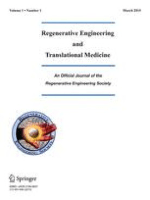
Regenerative Biomaterials
Scope & Guideline
Pioneering Innovations in Tissue Engineering
Introduction
Aims and Scopes
- Biomaterials Design and Synthesis:
Research into the design and synthesis of novel biomaterials, including hydrogels, scaffolds, and nanoparticles, tailored for specific regenerative applications in various tissues. - Tissue Engineering Strategies:
Exploration of innovative tissue engineering strategies that utilize biomaterials to support cell growth, differentiation, and tissue integration. - Biocompatibility and Bioactivity Evaluation:
Studies that assess the biocompatibility, bioactivity, and degradation profiles of biomaterials, ensuring their suitability for clinical applications. - Regenerative Medicine Applications:
Application-focused research that investigates the use of biomaterials in regenerative medicine, including wound healing, bone regeneration, and soft tissue repair. - Nanotechnology in Biomaterials:
Utilization of nanotechnology to enhance the properties and functionalities of biomaterials, improving their efficacy in regenerative medicine. - Multifunctional Biomaterials:
Development of multifunctional biomaterials that can provide therapeutic benefits, such as controlled drug delivery, anti-inflammatory effects, and antimicrobial properties.
Trending and Emerging
- 3D Bioprinting and Fabrication Techniques:
An increasing number of publications are focusing on 3D bioprinting technologies, which allow for the precise fabrication of biomaterials and tissue constructs that mimic natural tissues. - Smart and Responsive Biomaterials:
There is a growing interest in the development of smart biomaterials that can respond to environmental stimuli (e.g., pH, temperature, light) for controlled drug delivery and tissue regeneration. - Regenerative Applications of Nanomaterials:
Research is trending towards the application of nanomaterials in regenerative medicine, particularly in enhancing the properties of biomaterials and in targeted therapies. - Immunomodulatory Biomaterials:
Emerging research is focusing on biomaterials designed to modulate immune responses, which is critical for improving healing outcomes in various regenerative contexts. - Biomaterials for Chronic Wound Healing:
There is an increasing emphasis on developing biomaterials specifically aimed at addressing chronic wounds, with innovative approaches to enhance healing and reduce complications. - Integration of Machine Learning in Biomaterials Research:
The integration of machine learning and computational techniques to predict biomaterial behavior and optimize designs is gaining traction in the journal's publications.
Declining or Waning
- Traditional Biomaterials:
There is a noticeable decline in the publication of studies focused solely on traditional biomaterials without innovative modifications or applications, as the field increasingly emphasizes novel designs and multifunctionality. - Conventional Drug Delivery Systems:
Research centered on conventional drug delivery systems is waning, with a shift towards more complex, multifunctional systems that combine biomaterials with advanced drug delivery mechanisms. - Static Cell Culture Studies:
The prevalence of static in vitro cell culture studies is decreasing as researchers move towards more dynamic, 3D culture environments that better mimic in vivo conditions for tissue engineering. - Single-Function Biomaterials:
There is a reduction in the development and publication of single-function biomaterials, as the trend shifts towards creating multifunctional systems that address multiple therapeutic needs. - Surface Modification Techniques:
Research specifically focused on basic surface modification techniques is declining, with a growing emphasis on advanced techniques that integrate biological cues for improved biomaterial performance.
Similar Journals

Bioactive Materials
Pioneering Research in Biomedical Engineering and BiotechnologyBioactive Materials, published by KEAI PUBLISHING LTD, stands as a leading Open Access journal in the fields of Biomaterials, Biomedical Engineering, and Biotechnology. Since its inception in 2016, this journal has rapidly ascended in prominence, currently holding a prestigious Q1 category ranking across multiple disciplines, reflecting its significant impact within the scientific community. With its E-ISSN 2452-199X, it spans a broad spectrum of research areas, contributing valuable insights to the ongoing discourse in bioactive materials and their applications. The journal's superior Scopus rankings further illustrate its influence, boasting impressive standings in engaging niches such as engineering and molecular biology. Bioactive Materials offers a vital platform for researchers, professionals, and students to disseminate and acquire cutting-edge knowledge, thus fostering innovation and collaboration in the rapidly evolving terrain of biomedicine. Its commitment to Open Access since 2016 enhances accessibility, ensuring that the burgeoning advancements in this field reach a global audience.

JOURNAL OF BIOMEDICAL MATERIALS RESEARCH PART A
Pioneering research in biocompatible materials for medical innovation.JOURNAL OF BIOMEDICAL MATERIALS RESEARCH PART A, published by WILEY, is a leading journal in the field of biomaterials and biomedical engineering, showcasing cutting-edge research that bridges the gap between material science and healthcare applications. With a robust 2023 impact factor reflecting its high-quality contributions, this journal is classified in the Q2 quartile for Biomaterials, Biomedical Engineering, and Ceramics and Composites, while achieving an impressive Q1 ranking in Metals and Alloys. The journal caters to a diverse readership, including researchers, professionals, and students, aiming to facilitate innovation and advancements in biocompatible materials and their applications in medical devices and tissue engineering. Access options for readers are available, ensuring the latest studies and findings are readily accessible to all stakeholders in this dynamic field. As it progresses towards its 2024 target, the JOURNAL OF BIOMEDICAL MATERIALS RESEARCH PART A continues to be an essential resource for anyone involved in the development and application of biomedical materials.

Biomaterials Advances
Exploring the Future of Bioengineering with BiomaterialsBiomaterials Advances is a premier journal published by Elsevier, dedicated to the rapidly evolving field of biomaterials. Established in the United Kingdom, this open-access journal aims to disseminate high-quality, peer-reviewed research that explores innovative biomaterial designs and their applications in bioengineering and biomedical engineering. With an impressive 2023 impact factor reflected in its Q1 rankings across multiple categories—including Bioengineering, Biomaterials, and Biomedical Engineering—Biomaterials Advances stands out as a critical platform for scholars and practitioners faced with advancing technologies and methodologies in the realm of materials science. Covering a broad range of topics, from biocompatibility to tissue engineering, this journal provides an inclusive forum for researchers seeking to contribute to the field. Its Scopus rankings further affirm its position as a leading resource, with notable standings in Biomedical Engineering (Rank #13), Biomaterials (Rank #8), and Bioengineering (Rank #11), all within the top percentiles. Researchers and students alike are encouraged to contribute and engage with the latest findings and innovations in biomaterials through this valuable publication.

Tissue Engineering Part C-Methods
Empowering Research with Robust Tissue Engineering StrategiesTissue Engineering Part C: Methods is a prestigious academic journal published by MARY ANN LIEBERT, INC, specializing in the dynamic and rapidly evolving fields of bioengineering and biomedical engineering. With an ISSN of 1937-3384 and E-ISSN 1937-3392, this journal provides a platform for the dissemination of cutting-edge research from 2008 to 2024, showcasing methodologies that advance the science of tissue engineering. Ranked in the second and third quartiles across several categories in 2023, including a notable Q2 in Biomedical Engineering, the journal is recognized for its contributions to the interface of biology and engineering. Additionally, it holds commendable Scopus ranks that highlight its influence and reach within the scientific community. Although it does not offer open access, the journal remains vital for researchers, professionals, and students seeking insightful articles that bridge the gap between theoretical research and practical application in tissues and regenerative medicine. With its rigorous peer-review process and commitment to quality, Tissue Engineering Part C: Methods continues to be an essential resource for those at the forefront of tissue engineering innovations.

Regenerative Medicine
Transforming Health through Regenerative ScienceRegenerative Medicine, published by Taylor & Francis Ltd, is a pivotal journal within the field of biomedical research, focusing on the innovative advances in regenerative and restored functions in human health. With an ISSN of 1746-0751 and an E-ISSN of 1746-076X, this esteemed journal boasts a commendable impact factor within its categories, notably holding the Q2 status in Embryology and Q3 in Biomedical Engineering as of 2023. Covering a broad spectrum of topics from stem cell research to tissue engineering, it serves as a crucial platform for interdisciplinary collaboration among researchers, professionals, and students dedicated to the regeneration of tissues and organs. Given its comprehensive scope from 2006 to 2024, the journal continues to attract high-quality manuscripts that advance the frontiers of knowledge in regenerative medicine. Researchers and practitioners alike are encouraged to engage with the latest findings and methodologies disseminated in this vital publication.

International Journal of Biomaterials
Fostering collaboration for breakthrough advancements in biomaterials.The International Journal of Biomaterials, published by HINDAWI LTD, is a premier platform for disseminating groundbreaking research in the fields of biomaterials and biomedical engineering. With an Open Access approach since 2009, this journal provides unhindered access to innovative studies and applications aimed at advancing medical technologies and improving patient outcomes. Notably ranked in the Q3 category for both Biomaterials and Biomedical Engineering in 2023, it serves as an essential resource for researchers, practitioners, and students alike. The journal's Scopus rankings, including a 49th percentile in Biomedical Engineering and a 40th percentile in Biomaterials, further underscore its growing prominence in the academic community. With contributions spanning from 2011 to 2024, the journal seeks to foster collaborative research and promote developments that enhance the understanding and application of biomaterials in healthcare.

Regenerative Engineering and Translational Medicine
Driving Innovation at the Intersection of Science and HealthRegenerative Engineering and Translational Medicine is an esteemed academic journal published by Springer Heidelberg, focusing on the interdisciplinary fields of biomaterials, biomedical engineering, and cell biology. With an ISSN of 2364-4133 and an E-ISSN of 2364-4141, the journal has carved a niche for itself since its inception in 2015, showcasing cutting-edge research that bridges the gap between scientific findings and practical applications in regenerative medicine. As a recognized platform in its field, it is currently positioned within Q3 quartiles in biomaterials, biomedical engineering, and medicine (miscellaneous), with a Scopus ranking that reflects its growing influence among peers. The journal aims to disseminate high-quality, peer-reviewed articles that highlight advancements in regenerative engineering, further advancing both theoretical and applied research. Scholars and practitioners seeking to stay at the forefront of the ever-evolving landscape of regenerative health solutions will find invaluable insights and innovations within these pages. Join a community of leading thinkers and explore the journal's comprehensive research contributions, which are crucial for fostering partnerships between academia and industry in the quest for transformative medical solutions.

Tissue Engineering and Regenerative Medicine
Innovative Insights for the Future of Regenerative MedicineTissue Engineering and Regenerative Medicine, published by the Korean Tissue Engineering Regenerative Medicine Society, is a distinguished journal focusing on the interdisciplinary fields of tissue engineering, regenerative medicine, and related biomedical innovations. With an ISSN of 1738-2696 and an E-ISSN of 2212-5469, this journal disseminates cutting-edge research and advancements pivotal to developing therapeutic strategies that improve tissue function and repair. As a testament to its scholarly impact, it holds a Q2 ranking in both Biomedical Engineering and Medicine (miscellaneous) categories, reflecting its influence and relevance within the scientific community, particularly with a Scopus rank placing it in the 82nd percentile among similar journals. Although the journal does not offer open access, it provides vital insights and knowledge to researchers, professionals, and students involved in the quest for innovative solutions in medical science and engineering. With its convergence years extending from 2008 to 2024, the journal continues to be an essential platform for the dissemination of high-quality research that drives the field forward.

JOURNAL OF BIOMATERIALS SCIENCE-POLYMER EDITION
Unveiling breakthroughs in polymer biomaterials for healthcare.JOURNAL OF BIOMATERIALS SCIENCE-POLYMER EDITION, published by Taylor & Francis Ltd, is a distinguished scholarly journal dedicated to the exploration of biomaterials and their applications in various fields such as bioengineering, biomedical engineering, and biophysics. With an ISSN of 0920-5063 and an E-ISSN of 1568-5624, this journal offers a platform for researchers and professionals to share innovative findings and methodologies that advance the science of polymer-based biomaterials. The journal's impact within the academic community is underscored by its notable Scopus rankings, including a Q2 status in both Biomedical Engineering and Biophysics as of 2023, reflecting its significant contribution to advancing knowledge and practice in these fields. The scope of the journal spans from fundamental research to applications in medical devices and regenerative medicine, ensuring comprehensive coverage of the latest trends and breakthroughs. Although it does not currently offer open access options, the journal remains a pivotal resource for students, researchers, and professionals committed to the development and application of biomaterials in healthcare. For further details, the journal is based in Abingdon, United Kingdom, at 2-4 Park Square, Milton Park, OX14 4RN.

Gels
Connecting Scholars Through Open Access Gel ResearchGels is a distinguished, peer-reviewed journal published by MDPI, focusing on the innovative field of gels and their myriad applications across disciplines such as bioengineering, biomaterials, and organic chemistry. Since its inception in 2015, this Open Access journal has provided a platform for researchers to disseminate cutting-edge findings, enabling wider visibility and impact for their work. Based in Switzerland, Gels has firmly established itself within the academic community, achieving notable recognition as evidenced by its recent Q1 ranking in Polymers and Plastics, and multiple Q2 placements in related categories, demonstrating its relevance and importance in the field. The journal serves as a vital resource for professionals and scholars aiming to engage with the rapidly evolving research landscape surrounding gel technologies, making significant contributions to sustainable materials, drug delivery systems, and much more. With its commitment to Open Access, Gels ensures that research findings are readily accessible to all stakeholders, fostering collaboration and advancement in science and engineering fields.